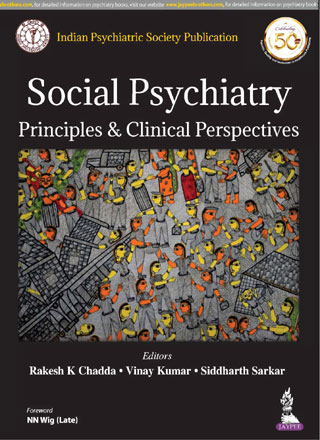Quick Overview
This book is divided into 5 sections.
Section 1 gives a brief introduction to the discipline of social psychiatry going into its historical development across the world and in India.
Section 2 includes conceptual issues on the relationship between mental health and society. It begins with a chapter on the concept of social psychiatry. It then highlights the family and social context in relation to the mental health of the individual. A chapter is included describing biological underpinnings in social psychiatry. Subsequently, social dimensions of behavior and personality development are discussed, along with the social dimension of spiritual health and psychiatric epidemiology. Psychology of sub-populations of the society are presented, and influence of culture, mythology and religion on mental health are delved upon in two subsequent chapters. The section also presents the social psychiatric aspects of marriage and similar affiliations. The visible and invisible stressors, which have a bearing on psychiatric manifestations, are highlighted in a subsequent chapter.
Section 3 covers the social dimensions of psychiatric disorders. The initial chapter in this section deals with health promotion aspect of evaluating the social well-being and health. Subsequent chapters discern the social psychiatric aspects of individual disorders, including schizophrenia and other psychotic disorders, depressive and bipolar disorders, anxiety disorders, somatoform and dissociative disorders, substance use disorders, psychosexual disorders, personality disorders, and suicide and similar behaviors. Disorders in special populations like childhood and adolescent disorders and psychiatric disorders of the elderly are also covered in this chapter. Physical comorbidity in psychiatry, which is a pertinent concern in the holistic management of patients, is also discussed in this section.
Section 4 expands upon the social interventions that are relevant to the field of social psychiatry. Social support and networking is presented first which highlights the dynamic social networks of the present times. Thereafter, couple therapies, family therapies, and group therapies are discussed. Subsequently, community models of care are presented followed by discussion on the rehabilitation of patients with psychiatric illnesses. Preventive psychiatry, which aims at reducing the incidence and burden of psychiatric disorders is also reviewed in this section. The section concludes by emphasis on cultural interventions for psychiatric disorders.
Section 5, the last section, dwells upon the social issues and mental health. The initial chapter here highlights the stigma of mental illness. Thereafter, migration and mental health are discussed. This is followed by psychiatry in the armed forces, where the application of social psychiatry concepts is an interesting reflection. The legislative aspects of mental health, under which the psychiatry is practiced, is presented next. The social impact of terrorism and extremism, which is very important in today’s world, is presented thereafter, followed by discussion on mass media, information technology and mental health. Pertinent issues of farmer suicides in India, rural mental health and urban mental health are discussed subsequently. The section concludes with a discussion on globalization, market economy and mental health. |
|
Key Features
| • Compendium on various psychosocial aspects related to Psychiatry.
• Covers both theoretical and clinical aspects related to psychosocial assessment and management; including aspects related to various illnesses.
• Attempts to be comprehensive in coverage and understanding conceptually and geographically.
• Thrust is on psychosocial issues pertinent to developing world; particularly Indian society and culture.
• Contributions from authors across different continents (Europe, USA, Asia); academicians and practicing psychiatrists alike.
• Strengths: Comprehensive; easy to read; avoidance of too much technical language; authors of different professional backgrounds; covering recent psychosocial phenomena.
• Clinicians, researchers, academicians and policy makers are likely to be benefited.
• Useful for varied mental health professionals, including psychiatrists, psychologists, mental health nurses, psychiatric social workers, and anyone else who is interested in the field of social psychiatry. |
|








